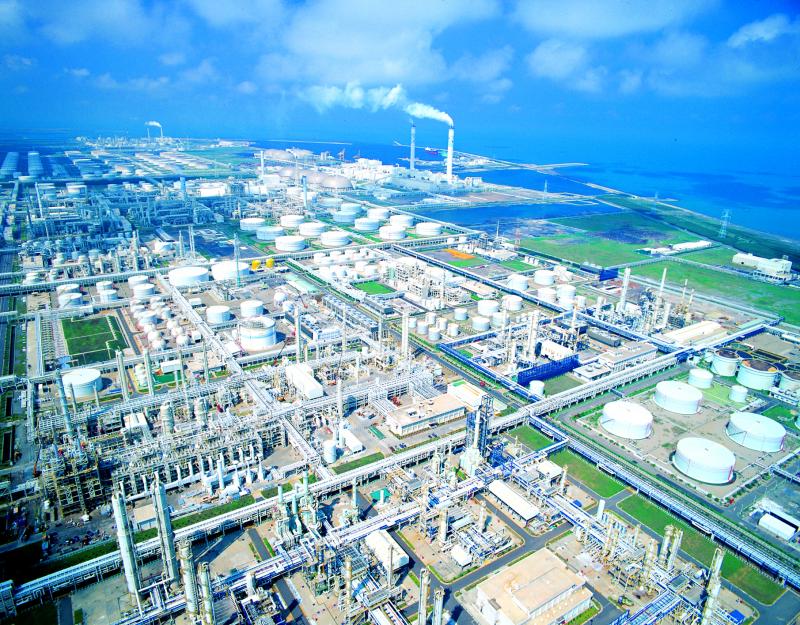Formosa Plastics Group (FPG, 台塑集團), the nation’s largest industrial conglomerate, yesterday reported combined revenue of its four major subsidiaries totaled NT$117.5 billion (US$4.14 billion) for last month, up 0.5 percent year-on-year, as three of them posted strong revenue growth on rising demand.
On a monthly basis, the four subsidiaries' combined revenue increased 2.3 percent, their filings with the Taiwan Stock Exchange showed.
The global economy’s continued recovery from the impact of the COVID-19 pandemic has led the four companies to revise upward their revenue expectations for the first quarter.

Photo: Chang Hui-wen, Taipei Times
Formosa Plastics Corp (FPC, 台塑), the group’s flagship firm, showed the largest year-on-year growth, with revenue of NT$19.22 billion — down 2.5 percent from December last year, but up 38.7 percent year-on-year.
“We had thought that an intensification of the COVID-19 pandemic plus a shortage of shipping containers would depress first-quarter revenue,” FPC president and chairman Jason Lin (林健男) said. “Now, we expect first-quarter revenue to equal or slightly surpass fourth-quarter revenue.”
Lin attributed the improved outlook to higher product prices and China’s “no travel” policy for the Lunar New Year holiday.
“Downstream workers will probably return to work earlier than expected after the holiday due to the ‘no travel’ policy,” Lin said.
Formosa Chemicals & Fibre Corp (台灣化學纖維) reported revenue of NT$26.75 billion, up 1.9 percent from December and 18.1 percent year-on-year, while Nan Ya Plastics Corp (南亞塑膠) reported revenue of NT$29.35 billion, up 3.6 percent from December and 31.5 percent year-on-year.
Nanya president Wu Chia-chau (吳嘉昭) attributed the figures — its eighth consecutive month of revenue growth — to demand for copper-clad laminate and other electronic components.
Formosa Petrochemical Corp (台塑石化) reported a contraction in year-on-year revenue to NT$42.24 billion — up 4.1 percent from December, but down 27.3 percent year-on-year.
Dubai crude oil is trading at US$9.2 per barrel less than last year, the company said.

The US dollar was trading at NT$29.7 at 10am today on the Taipei Foreign Exchange, as the New Taiwan dollar gained NT$1.364 from the previous close last week. The NT dollar continued to rise today, after surging 3.07 percent on Friday. After opening at NT$30.91, the NT dollar gained more than NT$1 in just 15 minutes, briefly passing the NT$30 mark. Before the US Department of the Treasury's semi-annual currency report came out, expectations that the NT dollar would keep rising were already building. The NT dollar on Friday closed at NT$31.064, up by NT$0.953 — a 3.07 percent single-day gain. Today,

‘SHORT TERM’: The local currency would likely remain strong in the near term, driven by anticipated US trade pressure, capital inflows and expectations of a US Fed rate cut The US dollar is expected to fall below NT$30 in the near term, as traders anticipate increased pressure from Washington for Taiwan to allow the New Taiwan dollar to appreciate, Cathay United Bank (國泰世華銀行) chief economist Lin Chi-chao (林啟超) said. Following a sharp drop in the greenback against the NT dollar on Friday, Lin told the Central News Agency that the local currency is likely to remain strong in the short term, driven in part by market psychology surrounding anticipated US policy pressure. On Friday, the US dollar fell NT$0.953, or 3.07 percent, closing at NT$31.064 — its lowest level since Jan.

Hong Kong authorities ramped up sales of the local dollar as the greenback’s slide threatened the foreign-exchange peg. The Hong Kong Monetary Authority (HKMA) sold a record HK$60.5 billion (US$7.8 billion) of the city’s currency, according to an alert sent on its Bloomberg page yesterday in Asia, after it tested the upper end of its trading band. That added to the HK$56.1 billion of sales versus the greenback since Friday. The rapid intervention signals efforts from the city’s authorities to limit the local currency’s moves within its HK$7.75 to HK$7.85 per US dollar trading band. Heavy sales of the local dollar by

The Financial Supervisory Commission (FSC) yesterday met with some of the nation’s largest insurance companies as a skyrocketing New Taiwan dollar piles pressure on their hundreds of billions of dollars in US bond investments. The commission has asked some life insurance firms, among the biggest Asian holders of US debt, to discuss how the rapidly strengthening NT dollar has impacted their operations, people familiar with the matter said. The meeting took place as the NT dollar jumped as much as 5 percent yesterday, its biggest intraday gain in more than three decades. The local currency surged as exporters rushed to